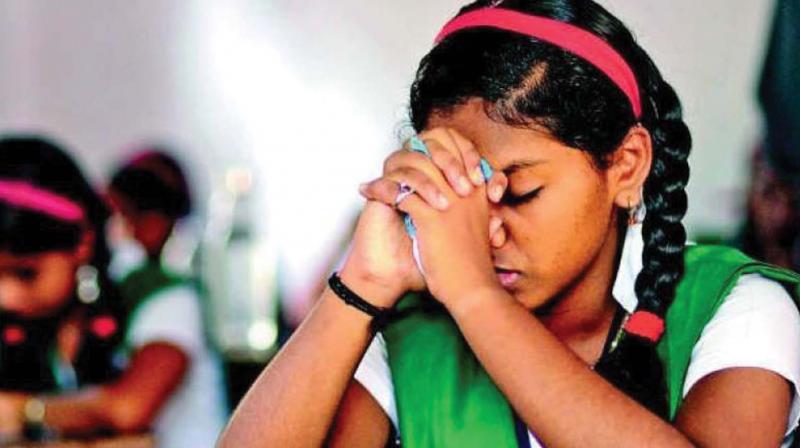Help teens overcome failures
Examination failure, failed relationship, a reprimand from a parent are not the end of the world.

The glorification of violence and suicides in movies, TV crime programmes and newspapers has become quite disturbing in our everyday life. The loss of respect for women, aberrant relationships, sexual assaults, recreational drugs and rave parties seem to be accepted as routine by our society and the media at large. Newspapers seem to glorify suicides by their screaming headlines, by the graphic descriptions of the death, by illustrations of a child hanging to death from a rope, and of course our ‘news channels’ keep playing these horrid scenes in their characteristically sensational repetitive scrolls.
If a child, who has attempted suicide, was caught copying in an examination, the poor teachers who reported it as part of due diligence are immediately blamed by the media and the parents, thereby responsible teachers are painted as ‘monsters’. Teenagers whose aggressive needs like high-end smart phones and motorbikes are not met by parents may threaten suicide and parents fall prey to this emotional blackmail. Again, our society tends to make ‘mother monsters’ and ‘father monsters’ of parents who refuse their children’s unwieldy demands. When a parent is unable to run to the adolescent child’s urgent need, and the child goes on to do something unwise, the parent is almost certainly painted villain by some media! Unfortunately, many mental health ‘experts’ misinterpret discipline as punishment, and diminish the core role of ‘mentoring’.
Mentoring Confused Teenagers
Adolescent mentoring is the establishment of a caring but firm relationship between an older and experienced parental figure (parents and also teachers in our setting) and an adolescent, which ultimately results in providing life skills. Children are not born with all life skills. Parenting, schooling and religion can teach them these skills. Bhagwat Gita is the epitome of a paradigm of mentoring. To a confused Arjuna who panicked, Bhagwan did not offer his shoulder but made Arjuna realise his skills to go on to fight the ‘Battle of Life’. Self-confidence and self-esteem: This is mentoring. Mentoring therefore involves helping the identification of the adolescent’s problems by themselves, the willingness to accept identified difficulties, to ‘seek help’ and to find the strength to fight and win struggles that life brings along.Instead, what do our so-called ‘experts’ advise often? Give children endless love and rights without any responsibilities, parents should be friends – or else they would go astray! Parents thus abdicate the responsibility of disciplining children by keeping a ‘personal space’ with them. Many confused parents do not understand that discipline is not synonymous with punishment. There should not be any screaming, yelling, pinching or beating to mentor our adolescent children. A reprimand or admonition should get parents and teachers the desired result of good, mature behaviour.
Effective Communication
Communicating effectively with teens need not be over a mug of beer as some of our cosmopolitan parents believe, but with the normal tone of ‘serious’ conversation. Empathy and not sympathy should be the basis of mentoring. Criticise what is clearly wrong in your child, but without taking away his/ her dignity and self-esteem. However, it is important to understand that living in fear of how your children will react if you criticise them will only destroy their character. Such mentoring makes it possible for adolescents to enable self-correction in the face of constructive criticism, instead of their responding by explosive behaviour. Such mentoring with ‘serious’ nature improves ‘bonding’ and the child’s ability to take ‘no’ for an answer. S/he learns to cope with ups and downs, highs and lows of his life experiences stoically. Such adolescents will not ever think of suicide as an option, or exploitative relationships as an escape from their sense of inferiority. The media need to change too, drastically. Watch the quality of disrespectful discourses in many of our channels and print media! Media hence have a huge responsibility to be a ‘social mentor’ for our adolescent children, encouraging qualities like respect for one another, the need to communicate in ways that are non-aggressive to find solutions to problems, and the habit to not unnecessarily dramatise all that is negative around us for selfish reasons (like more TRPs) needs to be brought back to social fabric.
Life Skills
Teaching life skills is cardinal to the whole process of mentoring adolescents. An examination failure, a failed relationship and a reprimand from a parent or teacher is not the end of the world. We would benefit our children and future society enormously by not blindly aping western concepts of intolerance. Let us go back to our roots of traditional wisdom of creating ‘tranquil equanimity’ and not agitation in our minds while facing the little or large battles of our life.
(Author is consultant in psychiatry)

